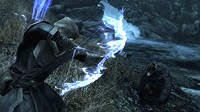《上古卷轴5》彩蛋大全 最容易被忽略的一百个彩蛋
第70页:西塞罗
展开西塞罗
如此特殊名字的人物,一定是在历史上有所借鉴,【刺客】对应的说法自然是【凶手】
Marcus Tullius Cicero[n 1] (/ˈsɪsᵻroʊ/; Classical Latin: [ˈmaːr.kʊs ˈtʊl.lɪ.ʊs ˈkɪ.kɛ.roː]; Greek: Κικέρων, Kikerōn; 3 January 106 BC – 7 December 43 BC) was a Roman philosopher, politician, lawyer, orator, political theorist, consul, and constitutionalist. He came from a wealthy municipal family of the Roman equestrian order, and is considered one of Rome's greatest orators and prose stylists.
His influence on the Latin language was so immense that the subsequent history of prose in not only Latin but European languages up to the 19th century was said to be either a reaction against or a return to his style. According to Michael Grant, "the influence of Cicero upon the history of European literature and ideas greatly exceeds that of any other prose writer in any language".Cicero introduced the Romans to the chief schools of Greek philosophy and created a Latin philosophical vocabulary (with neologisms such as evidentia,humanitas, qualitas, quantitas, and essentia) distinguishing himself as a translator and philosopher.
Though he was an accomplished orator and successful lawyer, Cicero believed his political career was his most important achievement. It was during his consulship that the second Catilinarian conspiracy attempted to overthrow the government through an attack on the city by outside forces, and Cicero suppressed the revolt by executing five conspirators without due process. During the chaotic latter half of the 1st century BC marked by civil wars and the dictatorship of Gaius Julius Caesar, Cicero championed a return to the traditional republican government. Following Julius Caesar's death, Cicero became an enemy of Mark Antony in the ensuing power struggle, attacking him in a series of speeches. He was proscribed as an enemy of the state by the Second Triumvirate and consequently executed by soldiers operating on their behalf in 43 BC after having been intercepted during attempted flight from the Italian peninsula. His severed hands and head were then, as a final revenge of Mark Antony, displayed in the Roman Forum.
Petrarch's rediscovery of Cicero's letters is often credited for initiating the 14th-century Renaissance in public affairs, humanism, and classical Roman culture.According to Polish historian Tadeusz Zieliński, "the Renaissance was above all things a revival of Cicero, and only after him and through him of the rest of Classical antiquity." The peak of Cicero's authority and prestige came during the 18th-century Enlightenment,and his impact on leading Enlightenment thinkers and political theorists such as John Locke, David Hume, Montesquieu and Edmund Burke was substantial.His works rank among the most influential in European culture, and today still constitute one of the most important bodies of primary material for the writing and revision of Roman history, especially the last days of the Roman Republic.
【Julius Caesar's civil war】
The struggle between Pompey and Julius Caesar grew more intense in 50 BC. Cicero favoured Pompey, seeing him as a defender of the senate and Republican tradition, but at that time avoided openly alienating Caesar. When Caesar invaded Italy in 49 BC, Cicero fled Rome. Caesar, seeking the legitimacy of an endorsement by a senior senator, courted Cicero's favour, but even so Cicero slipped out of Italy and traveled to Dyrrachium (Epidamnos), Illyria, where Pompey's staff was situated. Cicero traveled with the Pompeian forces to Pharsalus in 48 BC, though he was quickly losing faith in the competence and righteousness of the Pompeian side. Eventually, he provoked the hostility of his fellow senator Cato, who told him that he would have been of more use to the cause of the optimates if he had stayed in Rome. After Caesar's victory at Pharsalus, Cicero returned to Rome only very cautiously. Caesar pardoned him and Cicero tried to adjust to the situation and maintain his political work, hoping that Caesar might revive the Republic and its institutions.
In a letter to Varro on c. April 20, 46 BC, Cicero outlined his strategy under Caesar's dictatorship. Cicero, however, was taken completely by surprise when the Liberatores assassinated Caesar on the ides of March, 44 BC. Cicero was not included in the conspiracy, even though the conspirators were sure of his sympathy. Marcus Junius Brutus called out Cicero's name, asking him to restore the republic when he lifted his bloodstained dagger after the assassination. A letter Cicero wrote in February 43 BC to Trebonius, one of the conspirators, began, "How I could wish that you had invited me to that most glorious banquet on the Ides of March"! Cicero became a popular leader during the period of instability following the assassination. He had no respect for Mark Antony, who was scheming to take revenge upon Caesar's murderers. In exchange for amnesty for the assassins, he arranged for the Senate to agree not to declare Caesar to have been a tyrant, which allowed the Caesarians to have lawful support and kept Caesar's reforms and policies intact.
更多相关内容请关注:上古卷轴5:天际专区
责任编辑:向南
- 第1页:元气满满的雪地精
- 第2页:吃豆人
- 第3页:恶魔城II
- 第4页:爱尔兰符文
- 第5页:我的世界
- 第6页:寒霜的血统
- 第7页:骗子麦奎
- 第8页:幽灵刺客
- 第9页:停尸房
- 第10页:黑降的龙
- 第11页:信仰之跃
- 第12页:松加德的雕像
- 第13页:暗影标记
- 第14页:天际之音
- 第15页:山峰的秘密
- 第16页:锻莫迷宫
- 第17页:三牙海象岛
- 第18页:闹鬼屋子
- 第19页:锤子
- 第20页:莫萨尔吸血鬼任务
- 第21页:旋转载入画面
- 第22页:产地
- 第23页:纪念碑
- 第24页:神射手
- 第25页:魔人的宝藏
- 第26页:龙宵宫的不明尸骨
- 第27页:昆虫标本(1)
- 第28页:昆虫标本(2)
- 第29页:藏宝图(1)
- 第30页:藏宝图(2)
- 第31页:藏宝图(3)
- 第32页:藏宝图(4)
- 第33页:巨人棍棒
- 第34页:龙祸(1)
- 第35页:龙祸(2)
- 第36页:隐藏的面具
- 第37页:狂欢者
- 第38页:被冰冻的雪精灵
- 第39页:首席法师的待遇
- 第40页:击倒敌人的武器
- 第41页:末日之靴
- 第42页:誓言之剑
- 第43页:可以战斗的伐木斧
- 第44页:伐木工之友
- 第45页:巨魔克星
- 第46页:沙利多迷宫
- 第47页:独有武器类
- 第48页:独有物品类
- 第49页:独有装备类
- 第50页:盗贼的赃物桶-裂谷城
- 第51页:盗贼的赃物桶-马卡斯
- 第52页:盗贼的赃物桶-独孤城
- 第53页:盗贼的赃物桶-雪漫城
- 第54页:盗贼的赃物桶-风盔城
- 第55页:盗贼的赃物桶-索瑟姆
- 第56页:湖中剑
- 第57页:石中剑
- 第58页:凯尔特神话
- 第59页:北欧神话
- 第60页:魔兽世界
- 第61页:Fafhrd and the Gray Mouser
- 第62页:爱丽丝梦游仙境
- 第63页:亚瑟王的传说
- 第64页:宿醉
- 第65页:哈默林的花衣吹笛人
- 第66页:一言九鼎
- 第67页:吉他手
- 第68页:恋情
- 第69页:白雪公主与七个小矮人
- 第70页:西塞罗
- 第71页:野兽的数字
- 第72页:英勇猎人
- 第73页:游泳遭遇
- 第74页:罗密欧与朱丽叶
- 第75页:三只山羊
- 第76页:古老的游戏
- 第77页:街头霸王2
- 第78页:星际迷航(Star Trek)
- 第79页:银河访客
- 第80页:妙妙龙
- 第81页:慈母桂罗
- 第82页:星球大战
- 第83页:吸血鬼
- 第84页:圣诞夜惊魂
- 第85页:夺宝奇兵
- 第86页:驱魔人
- 第87页:高吼峰
- 第88页:疯神的彩蛋
- 第89页:重燃火焰
- 第90页:巨蟒剧团
- 第91页:龙与地下城
- 第92页:肖申克的救赎
- 第93页:松加德
- 第94页:地海传说
- 第95页:塞尔达传说
- 第96页:干呕水母
- 第97页:黄衣之王
- 第98页:盥洗室
- 第99页:洛奇4
- 第100页:与人交好
- 第101页:爱情药水9号
- 第102页:悼亡的新娘
- 第103页:公主新娘
- 第104页:地狱
- 第105页:弓箭大师
- 第106页:灵魂石冢
- 第107页:肉
- 第108页:蓝宝石
- 第109页:击落太阳
- 第110页:现存的龙祭祀
- 第111页:龙裔的祭祀
- 第112页:龙族-Alduin
- 第113页:龙族-Durnehviir
- 第114页:龙族-Krosulhah
- 第115页:龙族-Kruziikrel
- 第116页:龙族-Mirmulnir
- 第117页:龙族-Naaslaarum
- 第118页:龙族-Nahagliiv
- 第119页:龙族-Odahviing
- 第120页:龙族-Paarthurnax
- 第121页:龙族-Relonikiv
- 第122页:龙族-Sahloknir
- 第123页:龙族-Sahrotaar
- 第124页:龙族-Viinturuth
- 第125页:龙族-Vuljotnaak
- 第126页:龙族-Vulthuryol
- 第127页:龙族-Voslaarum
- 第128页:收割者
- 第129页:.黎明守卫的宝盒(1)
- 第130页:.黎明守卫的宝盒(2)
- 《Aerial_Knight's DropShot》官方正版下载
- 《Pure Pool Pro》官方中文版下载
- 《桌面战斗模拟器》官方中文版下载
- 《Those Who Dwell》官方正版下载
- 《Fear Night Tales》官方正版下载
- 《Cold Calling》官方正版下载
- 《Wizard Pool》官方正版下载
- 《Astro Protocol》官方正版下载
-
 圣女脱衣38rmb一次 沉沦诱惑不能自拔的囧图
圣女脱衣38rmb一次 沉沦诱惑不能自拔的囧图
 生化9首个更新补丁上线!PC端大小为1.4GB
生化9首个更新补丁上线!PC端大小为1.4GB
-
 知名rapper怒喷《生化9》大蜘蛛!有玩家换成小火车
知名rapper怒喷《生化9》大蜘蛛!有玩家换成小火车
 刺客信条Jade仍在开发中!秦朝背景 亮相仍需等待
刺客信条Jade仍在开发中!秦朝背景 亮相仍需等待
-
 红色沙漠承认公布太早了!饼画大了因此加倍努力
红色沙漠承认公布太早了!饼画大了因此加倍努力
 刺客信条大革命迎次世代升级!还有免费试玩活动
刺客信条大革命迎次世代升级!还有免费试玩活动
- onlyfans性感女星:我总收入已经达到1亿美元
- 性感女星抱怨床上生活不顺利!丈夫总想和她早上开嗨
- “张杰前助理”吐槽谢娜张杰:张杰他就不是个男人!
- 里昂个人秀!爆料称《生化9》DLC已接近完成
- 全部融合!二次元+3D弹幕+动作真的有搞头?
- 夫妻上一秒在聊天 下一秒丈夫去世:几分钟阴阳相隔
- 三上悠亚自曝:我的体毛曾拍出300万日元天价
- 《生化9》同人图:王阿姨美腿“夹爆”里昂大头
- 速滑性感女神"内衣门"事件发酵 被质疑违规擦边
- 生化危机9新爆料:吉尔与艾达王现身!






























